|
|
|
Sort Order |
|
|
|
Items / Page
|
|
|
|
|
|
|
| Srl | Item |
| 1 |
ID:
139285
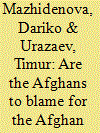

|
|
|
|
|
| Summary/Abstract |
Afghanistan has been and will probably remain not so much an equal partner for the nations around it, as a kind of buffer or ideological (and sometimes military) front where battles are waged, cease-fires are entered, and political “exchanges” are carried out. This country, which is called the heart of Asia in diplomatic terms, is merely a venue for major political bargaining, but not a real participant in it. Today’s attitude toward the problems of various regional and global nations makes resolution of the Afghan question difficult and requires a multi-stage approach; in order to tackle this task, the countries of the international community are setting up various dialog venues and mechanisms.
At that, Afghanistan represents a melting pot of Central Asian, East Iranian, Persian, and Turkic traditions that go back to Muslim Shi’ism, Hinduism, Buddhism, and Taoism. It is this intricate conglomerate that has determined the difficult lives of the people who call themselves Afghans and are trying to find their own niche in the Eurasian continent.
|
|
|
|
|
|
|
|
|
|
|
|
|
|
|
|
| 2 |
ID:
139280
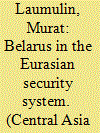

|
|
|
|
|
| Summary/Abstract |
The Republic of Belarus occupies the western periphery of geopolitical Eurasia, by which I mean the post-Soviet space, and is fairly far removed from Central Asia. This distance, however, does not mean that Belarus is safely protected from the security threats emanating from the Central Asian region, and, on the whole, Inner Eurasia. The Belarusian expert community is not indifferent to these problems. Belarus has preserved its military and strategic importance for Russia within the categories of European confrontation of the previous period. Today, it is consistently and actively involved in military integration within the CSTO. The armed forces of Russia and Belarus are tied together by the so-called coalition approach. Civilian and military experts of the Republic of Belarus are studying the hypothetical possibility of its involvement, at the technical level, in the Collective Rapid Reaction Force of the CSTO if and when NATO pullout of Afghanistan sends waves of instability across Central Asia.
|
|
|
|
|
|
|
|
|
|
|
|
|
|
|
|
| 3 |
ID:
139283
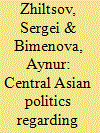

|
|
|
|
|
| Summary/Abstract |
This article analyzes the situation regarding the water resources of the transboundary rivers that developed in Central Asia after the collapse of the Soviet Union when the previous mechanism of mutual account of the interests of all the Central Asian republics broke down. Particular attention is given to studying the factors that have an impact on the formation and implementation of Central Asian politics regarding water use. A comparison is made of the international legal base that regulates conflicts involving the water resources of transboundary rivers and the legal documents of the Central Asian states. The paper analyzes the reasons for the failure to create a multisided mechanism for resolving the disputes that arise among the Central Asian countries with respect to water use of the transboundary rivers.
|
|
|
|
|
|
|
|
|
|
|
|
|
|
|
|
| 4 |
ID:
139284
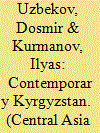

|
|
|
|
|
| Summary/Abstract |
The authors undertake the challenging task of going to the roots of the political instability that enveloped Kyrgyzstan during the period of democratic transit and discover that the bureaucratic state cannot adapt democratic values to the local conditions and, most importantly, does not want to do this. The political elite of Kyrgyzstan, which remains under the spell of Soviet political and spiritual legacy and which has been exhausted by two coups, demonstrates a very low level of cohesion and weakened political will. The authors describe the ways and means that will help the state and society remove the obstacles and remedy the shortcomings to finally acquire political stability and move forward.
|
|
|
|
|
|
|
|
|
|
|
|
|
|
|
|
| 5 |
ID:
139281


|
|
|
|
|
| Summary/Abstract |
Research indicates that in Central Asia and Azerbaijan the patterns of devotion to the Islamic faith are not uniform. Although the vast majority of Central Asians consider Islam to be an integral part of their social identity, the years of rule by the Soviet regime have affected the Islamic faith. This study investigates the different patterns of religious observance in Kazakhstan, Kyrgyzstan, Uzbekistan, Tajikistan, and Azerbaijan. Latent class analysis (LCA) is used to examine the profiles of religious observance based on data obtained from the Gallup World Poll. Across the five countries, three distinct classes emerge from the analyses: Devout Pious, Moderate Pious, and Soviet Muslims. Additionally, the predictive variables are considered and demographic covariates are examined in multinomial logistic regressions. Gender, educational level, and income are predictive of class membership in most of these countries. This study is a ground-breaking attempt to quantitatively examine classifications of devotion to Islam in post-Soviet republics with a majority Muslim population.
|
|
|
|
|
|
|
|
|
|
|
|
|
|
|
|
| 6 |
ID:
139287
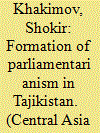

|
|
|
|
|
| Summary/Abstract |
This article examines the comparative legal, theoretical, and historical aspects of parliamentarianism. The author analyzes the formation of Tajik parliamentarianism and describes its primary characteristics. He also gives the reasons for the formation of parliamentarianism in Tajikistan and the obstacles hindering it.
|
|
|
|
|
|
|
|
|
|
|
|
|
|
|
|
| 7 |
ID:
139288


|
|
|
|
|
| Summary/Abstract |
This paper examines recent developments in refugee policy in the Republic of Kazakhstan. Specifically it considers the context of adoption of policy output—the Refugee Law—and Kazakhstan’s compliance with international commitments on providing socioeconomic support to refugee community. The analysis reveals that ratification and subsequent steps to put international policy into practice in this particular case are symbolic gestures to gain legitimation in international society without actually aligning the domestic legal system with international commitments. Although the Refugee Law appears to grant rights and protections consistent with international accords, it does so only superficially as these are undermined by a complex set of national laws and policies that have precedence over the Refugee Law. Only after the Refugee Law was adopted, Kazakhstan under intensive pressure of international organizations started slowly bringing its refugee policy into actual compliance with international standards. The process, even though important, has proved to be very slow, cumbersome and only piecemeal and in reality has amounted to walking in place.
|
|
|
|
|
|
|
|
|
|
|
|
|
|
|
|
| 8 |
ID:
139286


|
|
|
|
|
| Summary/Abstract |
The Georgian national myth is based on active promotion and actualization of Kartvelian narratives. The Kartvelian dimension of Georgian national identity has different forms, cultural Kartvelism, or, rather, studies of the languages and history of the Kartvelian ethnic groups, being one of them. The Kartvelian ideas serve as the background against which ancient Georgians are glorified and mythologized; the Kartvelian narratives form the core of Georgian ethnic nationalism and Georgian historical and political imagination.
|
|
|
|
|
|
|
|
|
|
|
|
|
|
|
|
| 9 |
ID:
139282


|
|
|
|
|
| Summary/Abstract |
The authors present a prognosis of the policy of five Central Asian countries in order to identify the main problems associated with the essential absence of development of real, deep, and extensive forms of multilateral cooperation in the region. The main accent is placed on identifying/explaining the key reasons/factors of the unwillingness of Kazakhstan, Kyrgyzstan, Tajikistan, Turkmenistan, and Uzbekistan to cooperate with each other, as well as on demonstrating the negative consequences of the absence of the necessary level of trust, cooperation, and integration in the region.
|
|
|
|
|
|
|
|
|
|
|
|
|
|
|
|
| 10 |
ID:
139289
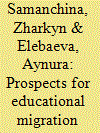

|
|
|
|
|
| Summary/Abstract |
As globalization of the world economy increases, the scope of intellectual migration continues to spread. One of its forms is student or educational migration—a phenomenon that largely dates to the end of the 20th century and has not been sufficiently studied so far. As for Kyrgyzstan, this is essentially the first time intellectual and student migration has been studied.
Any migration, including intellectual, undermines a country’s national potential. It should also be kept in mind that the host countries use migrants to achieve specific ideological and political goals.
|
|
|
|
|
|
|
|
|
|
|
|
|
|
|
|
| 11 |
ID:
139279
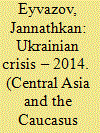

|
|
|
|
|
| Summary/Abstract |
The author analyzes the impact of the current Ukrainian crisis on the political structure of the post-Soviet region and national security of the Azerbaijan Republic. The events that have been unfolding in Ukraine since 2014 can be described as the acutest crisis in the relations between the Russian Federation and the West since the end of the Cold War, while the emerging situation is fraught with changes at the regional level and in the security context of all the post-Soviet states.
At the regional level, these changes have added to structural instability and, hence, transitivity. Azerbaijan, as a regional state, is facing greater structural risks accompanied by much fewer economic and political opportunities to implement its national security strategy.
|
|
|
|
|
|
|
|
|
|
|
|
|
|
|
|
|
|
|
|
|